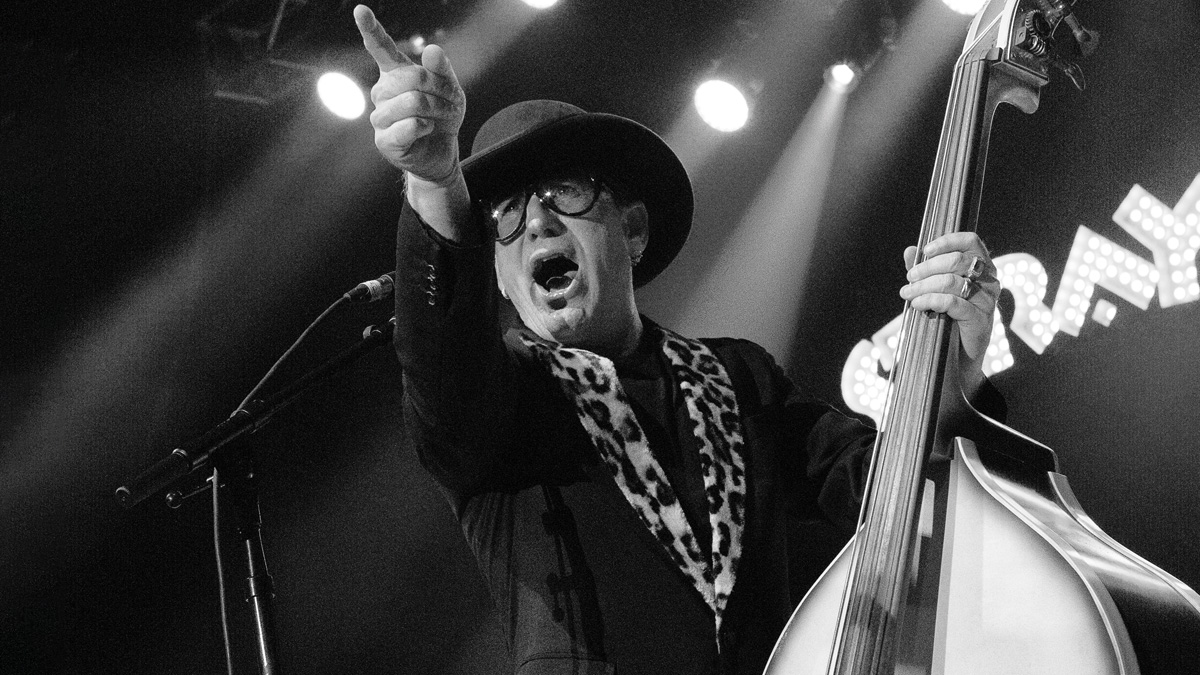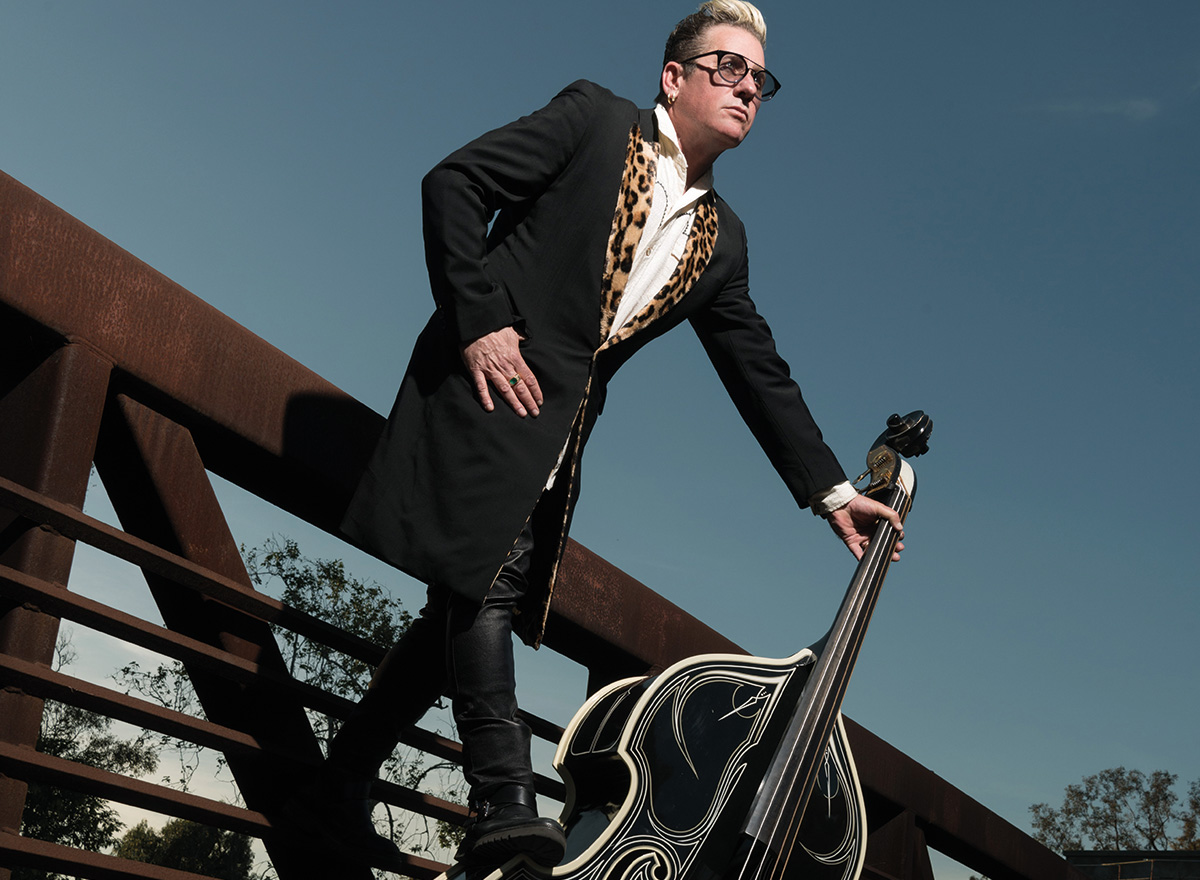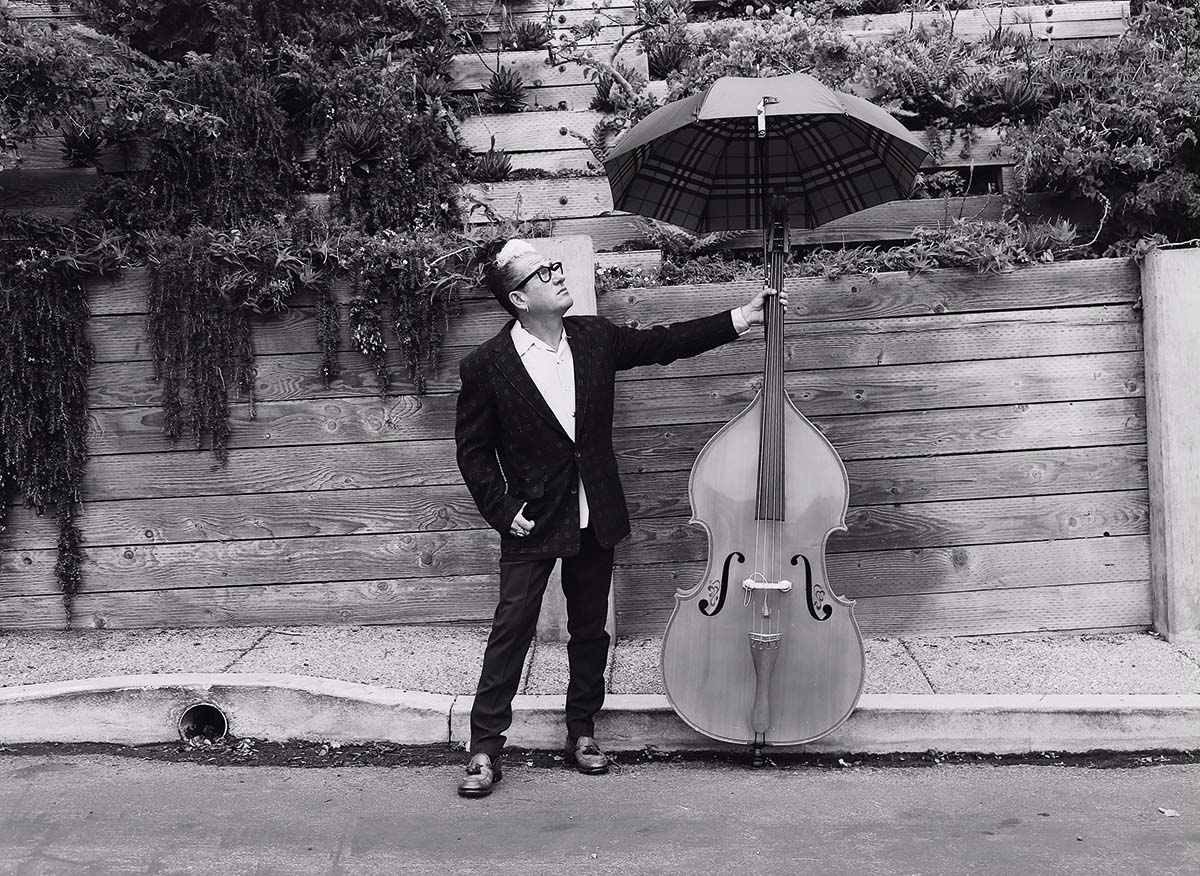Lee Rocker: ”Elvis was like Batman or Superman when I was a little kid – even before I was aware of his music. It’s so raw”
The Stray Cats’ rockabilly legend talks writing an album on an Airstream trailer, the energy of the old stuff and why there are still plenty of note choices to discover after all these years

Rockabilly bass is alive, well, and thriving in the hands of Lee Rocker, Stray Cats bassist and solo artist for the past four decades and counting.
After 11 studio albums with the veteran trio and even more of his own, he’s the most successful player of '50s-indebted rock bass currently performing, but that doesn’t mean he takes anything for granted: his new album, Gather Round, was recorded in novel circumstances, as he tells us.
How has the pandemic been for you, Lee?
”It’s been a crazy year, but I think we’re gonna be all right at the end. I’m an optimist, so I’m looking forward to the future. I hadn’t done an album of original songs in a few years, so for Gather Round, my wife and I went out on the road in one of these Airstream vehicles. We covered 6,000 miles in 20 states, because it was an escape – a way to keep it together.”
Like being on tour without the concerts?
”Exactly. I’m so used to going from one place to another, and mapping it out and having that kind of tour mentality, that it took on a little bit more normalcy than it would have otherwise. I wrote a bunch of songs while doing it. A couple of songs were written before we went out, but the vast majority of this record was written on this road.”
What was your route?
Get The Pick Newsletter
All the latest guitar news, interviews, lessons, reviews, deals and more, direct to your inbox!
”We went from Southern California, all through the south to Route 66 – basically from LA to Virginia – and then took a left up to New York, where we spent two or three weeks, and then headed back in a more northern route. We didn’t jam it the whole time, but I think I did about 11 or 12 days getting there, and a bit more getting back.”
So a double bass fits into an Airstream?
”No, I took an acoustic guitar with me on the road, but I have bass guitars and amps in New York, in my apartment there. When I got back to California, I booked the studio and did the record. I did a large amount of it myself, with my musicians sending in their tracks from their own home studios.
”This record was a meticulous process in that way. 90 percent of the time in the studio was me in the play room, and my engineer behind the glass in the control room, where I never went. It was like being on the moon or something, because it was so isolating.”
I usually write on guitar and piano, but I’m always aware, even if I’m not writing with the bass, what it would be doing
It obviously worked well that way, because the album sounds great.
”There’s two ways to do records, you know, and it’s not even down to the damn pandemic. You can plug in with a band and let it rip, and then spend time going back and seeing what you got – or you can do it this way, where every note and every drumbeat is there for a reason. Those are two routes to the same end game. One doesn’t mean you’re brimming with energy and power. The other one doesn’t mean it’s sterile.”

Tell us about the other musicians on Gather Round.
”Buzz Campbell is a fantastically talented guitar player. I produced one of his records about 30 years ago, and we’ve worked together on and off ever since. Larry Mitchell is an amazing drummer, and I got a young piano and keyboard player out of West Virginia, Matt Jordan. These guys are great. We’ve done a lot of work together, and they know what they’re doing because they know what I’m looking for.”
Do you write songs on bass?
”I usually write on guitar and piano, but I’m always aware, even if I’m not writing with the bass, what it would be doing. The way I do it is I decide a tempo, set a click track, strum the song and throw a guide vocal on it. Then I play some bass and have my drummer give me two or three or four different patterns – you know, maybe sticks, maybe brushes, maybe half-time, maybe double-time. Then I move things around until they feel right.”
The song Graceland Auction refers to the legacy of Elvis Presley.
”I love Elvis’s music. You know, Elvis was like Batman or Superman when I was a little kid – like a superhero – even before I was really aware of his music. It’s so raw. There was no filter between the audience and the music, especially when it was just Elvis, Scotty Moore, Bill Black, and DJ Fontana. You’re in the room with them, it was so real.”
What are the basses on the new album?
”This album was a little bit different in that sense, partly because I didn’t have access to all of my instruments in storage, so it was kind of a DIY kind of situation. I did a lot of it on one of my Kolstein basses with gut strings and a piezo pickup. I went very organic with everything on this record. It literally was a microphone in front of the bass.
”I did run the pickup into the studio, and we would reamp sometimes, to get a little bit more warmth or presence. I also play basses by Blast Cult in London – Jason Burns is one hell of a luthier and bass-maker. They are works of art. Jason has been a dear friend and a collaborator with me for a long, long time. He’s been on the road with me, taking care of instruments and maintaining them. It’s one of the things I can’t do. I mean, I can change strings and throw a pickup in there, but beyond that, I need help.”

How are you improving as a bass player as time passes?
”I think that this forced pause, in life and in music, and going into the studio in this way, made me look at things a little differently. What’s the expression with a computer – defragging? It was a chance to get back to the basics of it and look at things a little differently. It’s not the same old thing, like ‘We’re going from the five to the four chord here.’ I have different ideas – I can do this, or I can do that, or I can do something else.”
Are your note choices different to the ones you chose 20 years ago?
”Definitely. I think my vocabulary as a musician has improved. I think the goal always has to be that way, for all musicians. There’s nothing more exciting than discovering something and going, ‘Why the hell didn’t I think of that 15 years ago?’ It’s amazing. I mean, you have four strings and 12 notes, and it’s still an infinite number of choices.”
When you listen back to your very early recordings, how do they sound?
”Overall, I love those recordings. They’re a snapshot. On the first Stray Cats album, I was 17 or 18 years old. It was the summer of 1980, and we’d just moved to London. I didn’t know a whole lot, but it’s got that spirit, that energy. It’s great playing all around, and I think the records stand the test of time.”
What kind of kid were you back then?
”Very young. Rock and roll was young at that point too, at least for us. We didn’t know anything. I remember going to the studio with the producer Dave Edmunds in the early days, and someone brought a set of strings for the bass. I had my bass from New York and it had an electric bass pickup, basically nailed into the fingerboard.
”So we go, ‘Let’s try these strings’ and spent ages unwinding them and putting them on the bass. They were gut strings, not steel ones, and it took us an hour to figure out why weren’t getting any signal. We had to put the old ones back on, of course. There was a lot of stuff we didn’t know.”
There was a whole wave of psychobilly bands that followed in your footsteps. Did you pay much attention to them?
”I was aware of them. Some of them opened shows for us over the years. In some ways, we started off as a psychobilly band, and evolved from there. I hear our early live recordings every once in a while, and I go, ‘Damn’. I mean, the tempo is just breakneck. The songs would last like a minute and 45 seconds.”
I hear our early live recordings every once in a while, and I go, ‘Damn’. I mean, the tempo is just breakneck
Do you play much bass guitar?
”A little bit. I do have a couple, and I’ll sit down and play some at times. I started as a little kid on cello, and then moved to electric bass and upright bass. In the mid-'80s I played electric with the Stray Cats on some songs. I also did two albums with Phantom, Rocker & Slick, which was [Stray Cats drummer] Slim Jim, myself and Earl Slick, David Bowie’s guitar player. There’s a lot of electric bass on that. A bass guitar is always in the room with me. If it’s the right tool for the job, I’ll use it.”
So what’s next?
”Well, I’m really happy with this record, and it’s my job to get it out there, because I really care about it. I think it’s the most personal record I’ve done in some ways. I’m not exactly sure why, but to me it really feels that way. I feel very close to this record, so we’re doing a lot of videos and a lot of social media, and we have concerts booked for the last half of the year. I’m out there, talking to people. I can’t wait for better times to come, and I think they’ll be here soon.”
- Gather Round is out now on Upright Records
Bass Player is the world’s most comprehensive, trusted and insightful bass publication for passionate bassists and active musicians of all ages. Whatever your ability, BP has the interviews, reviews and lessons that will make you a better bass player. We go behind the scenes with bass manufacturers, ask a stellar crew of bass players for their advice, and bring you insights into pretty much every style of bass playing that exists, from reggae to jazz to metal and beyond. The gear we review ranges from the affordable to the upmarket and we maximise the opportunity to evolve our playing with the best teachers on the planet.
“I asked him to get me four bass strings because I only had a $29 guitar from Sears”: Bootsy Collins is one of the all-time bass greats, but he started out on guitar. Here’s the sole reason why he switched
“I got that bass for $50 off this coke dealer. I don’t know what Jaco did to it, but he totally messed up the insides!” How Cro-Mags’ Harley Flanagan went from buying a Jaco Pastorius bass on the street to fronting one of hardcore’s most influential bands


![John Mayer and Bob Weir [left] of Dead & Company photographed against a grey background. Mayer wears a blue overshirt and has his signature Silver Sky on his shoulder. Weir wears grey and a bolo tie.](https://cdn.mos.cms.futurecdn.net/C6niSAybzVCHoYcpJ8ZZgE.jpg)

![A black-and-white action shot of Sergeant Thunderhoof perform live: [from left] Mark Sayer, Dan Flitcroft, Jim Camp and Josh Gallop](https://cdn.mos.cms.futurecdn.net/am3UhJbsxAE239XRRZ8zC8.jpg)






